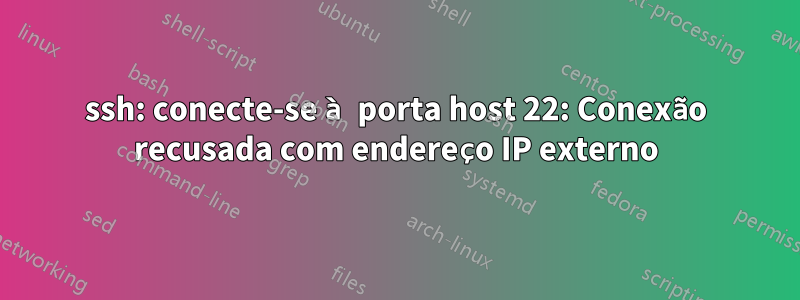
ssh: connect to host XXX.XXX.XXX.XX port 22: Connection refused
Isso acontece quando tento me conectar com um ip externo (endereço IP WAN).
Consigo me conectar com sucesso usando o endereço IP interno na LAN.
O que está errado, por que não consigo me conectar com IP externo?
Observe que fiz o encaminhamento de porta no roteador para meu endereço IP interno para ssh na porta 22.
Quando eu corrops -eaf|grep sshd
raiz 5942 1 0 18:42 ? 00:00:00 /usr/sbin/sshd
1000 6628 6382 0 18:55 pontos/0 00:00:00 grep sshd
ao executar ssh -VV[e-mail protegido]
OpenSSH_6.0p1 Debian-4, OpenSSL 1.0.1e 11 de fevereiro de 2013
Meu arquivo sshd_config:
# Package generated configuration file
# See the sshd_config(5) manpage for details
# What ports, IPs and protocols we listen for
Port 22
# Use these options to restrict which interfaces/protocols sshd will bind to
#ListenAddress ::
#ListenAddress 0.0.0.0
Protocol 2
# HostKeys for protocol version 2
HostKey /etc/ssh/ssh_host_rsa_key
HostKey /etc/ssh/ssh_host_dsa_key
HostKey /etc/ssh/ssh_host_ecdsa_key
#Privilege Separation is turned on for security
UsePrivilegeSeparation yes
# Lifetime and size of ephemeral version 1 server key
KeyRegenerationInterval 3600
ServerKeyBits 768
# Logging
SyslogFacility AUTH
LogLevel INFO
# Authentication:
LoginGraceTime 120
PermitRootLogin yes
StrictModes yes
RSAAuthentication yes
PubkeyAuthentication yes
#AuthorizedKeysFile %h/.ssh/authorized_keys
# Don't read the user's ~/.rhosts and ~/.shosts files
IgnoreRhosts yes
# For this to work you will also need host keys in /etc/ssh_known_hosts
RhostsRSAAuthentication no
# similar for protocol version 2
HostbasedAuthentication no
# Uncomment if you don't trust ~/.ssh/known_hosts for RhostsRSAAuthentication
#IgnoreUserKnownHosts yes
# To enable empty passwords, change to yes (NOT RECOMMENDED)
PermitEmptyPasswords no
# Change to yes to enable challenge-response passwords (beware issues with
# some PAM modules and threads)
ChallengeResponseAuthentication no
# Change to no to disable tunnelled clear text passwords
#PasswordAuthentication yes
# Kerberos options
#KerberosAuthentication no
#KerberosGetAFSToken no
#KerberosOrLocalPasswd yes
#KerberosTicketCleanup yes
# GSSAPI options
#GSSAPIAuthentication no
#GSSAPICleanupCredentials yes
X11Forwarding yes
X11DisplayOffset 10
PrintMotd no
PrintLastLog yes
TCPKeepAlive yes
#UseLogin no
#MaxStartups 10:30:60
#Banner /etc/issue.net
# Allow client to pass locale environment variables
AcceptEnv LANG LC_*
Subsystem sftp /usr/lib/openssh/sftp-server
# Set this to 'yes' to enable PAM authentication, account processing,
# and session processing. If this is enabled, PAM authentication will
# be allowed through the ChallengeResponseAuthentication and
# PasswordAuthentication. Depending on your PAM configuration,
# PAM authentication via ChallengeResponseAuthentication may bypass
# the setting of "PermitRootLogin without-password".
# If you just want the PAM account and session checks to run without
# PAM authentication, then enable this but set PasswordAuthentication
# and ChallengeResponseAuthentication to 'no'.
UsePAM yes
Responder1
Tem certeza de que fez a coisa correta no roteador (ou seja, isso já funciona com outra porta em outro serviço)?
Estou perguntando porque "conexão recusada" acontece no nível TCP e o motivo geralmente é que ninguém está escutando naquela porta na máquina de destino (isso seria o equivalente a sshd não estar em execução) ou algum firewall bloqueando-o.
Como você diz que funciona com um endereço da sua rede local, parece que o roteador não está encaminhando ou encaminha para outra coisa.
Responder2
Adicione a seguinte linha ao seu arquivo de configuração do usuário ssh conforme mostrado abaixo.
vi ~/.ssh/config
Host *
ServerAliveInterval 300
Altere a permissão conforme abaixo:
chmod 600 ~/.ssh/config
Reinicie o daemon. Espero que isto ajude.


